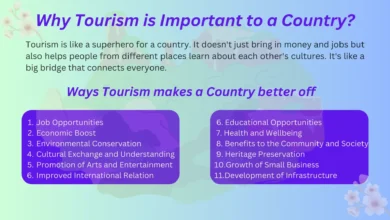
What is Beach Tourism?
Beach tourism is a globally popular and vibrant industry that attracts millions of travelers each year. The allure of coastal areas and beach destinations for recreational activities, relaxation, and enjoyment of natural beauty has made beach tourism a highly sought-after vacation choice. From the serene shores of secluded beaches to bustling seaside resorts, these destinations offer a plethora of experiences for visitors to indulge in.
With a wide range of activities available, beach tourism caters to diverse interests and preferences. Whether it’s lounging on the sand, partaking in exhilarating water sports, exploring vibrant marine ecosystems, seeking wellness and rejuvenation, or creating cherished family memories, beach destinations provide something for everyone.
In this blog, we will explore the various types of beach tourism, delve into the economic impact it has on both local and national levels, and highlight its significance in diversifying economies, enhancing destination competitiveness, and providing economic stability. It is a dynamic and influential sector that continues to contribute to the growth and prosperity of coastal regions worldwide.
Beach Tourism
Beach tourism refers to the practice of traveling to coastal areas or beach destinations for recreational purposes, leisure activities, and relaxation. It involves visiting beaches, seaside resorts, and coastal towns with the primary intention of enjoying the natural beauty of the beach, engaging in water-related activities, and basking in the sun.
Beach Tourism is popular worldwide and attracts millions of tourists each year. It encompasses various activities such as swimming, sunbathing, beachcombing, surfing, snorkeling, scuba diving, sailing, fishing, beach volleyball, and other water sports. Many beach destinations offer amenities such as beachside resorts, hotels, restaurants, bars, shops, and entertainment options to cater to tourists’ needs and provide a memorable vacation experience.
Types of Beach Tourism
There are various types of beach tourism that cater to different preferences and interests. Here are some common types.
- Leisure Tourism
- Adventure Tourism
- Ecotourism
- Wellness Tourism
- Family Tourism
Leisure Tourism
This type of beach tourism revolves around relaxation, sunbathing, and enjoying the beach environment. Tourists seek to unwind and rejuvenate, spending their time lounging on the sand, swimming in the ocean, and soaking up the sun.
Adventure Tourism
Adventure beach tourism attracts thrill-seekers who are looking for exciting and adrenaline-pumping activities. It includes water sports such as surfing, kiteboarding, jet skiing, and parasailing. These activities provide an adventurous experience for those seeking an active and dynamic beach vacation.
Ecotourism
Ecotourism beach destinations focus on the conservation and appreciation of natural environments. Visitors engage in activities that promote environmental awareness and sustainability. They may participate in snorkeling or diving to explore coral reefs, engage in beach clean-up initiatives, or visit protected areas like marine reserves and wildlife habitats.
Wellness Tourism
Wellness beach tourism targets individuals seeking relaxation, rejuvenation, and holistic well-being. These destinations often provide yoga classes, spa treatments, meditation sessions, and wellness retreats by the beach. Visitors can indulge in activities that promote mental and physical well-being, such as beach yoga, massage therapies, and holistic healing practices.
Family Tourism
Family beach tourism caters to travelers with children. These destinations provide family-friendly amenities and activities, including shallow swimming areas, playgrounds, water parks, and kid-friendly entertainment. Family-oriented beach resorts often offer childcare services and organize family-friendly events to create a memorable experience for all family members.
Economic Impact of Beach Tourism
It has a significant economic impact on both local and national levels. Here are some key points highlighting its economic significance.
- Revenue Generation
- Employment Opportunities
- Business Development
- Infrastructure Investment
- Government Revenue
- Economic Diversification
- Destination Competitiveness
- Seasonal and Year-Round Tourism
Revenue Generation
Beach tourism generates substantial revenue through various channels. Tourists spend money on accommodations, dining, shopping, transportation, and recreational activities, injecting money into the local economy. This spending supports businesses and stimulates economic growth.
Employment Opportunities
Beach tourism creates employment opportunities across a wide range of sectors. Hotels, resorts, restaurants, tour operators, water sports facilities, and other businesses directly related to beach tourism require a workforce. This sector provides jobs not only for hotel staff and tour guides but also for local vendors, taxi drivers, artisans, and other service providers.
Business Development
The presence of beach tourism often drives the development of supporting industries. Local businesses cater to the needs of tourists by offering services such as beach gear rentals, souvenir shops, spa and wellness facilities, and transportation services. These businesses flourish due to the consistent influx of tourists, leading to entrepreneurship and business growth.
Infrastructure Investment
To accommodate tourists, beach destinations require infrastructure development. This includes the construction and maintenance of hotels, resorts, restaurants, airports, roads, and recreational facilities. These investments create jobs during the construction phase and contribute to the long-term development of the area.
Government Revenue
Beach tourism generates revenue for governments through various means. Taxes, including hotel taxes, sales taxes, and transportation taxes, contribute to government budgets. This revenue can be used for public services, infrastructure improvements, and community development projects.
Economic Diversification
Beach tourism can help diversify economies that heavily rely on traditional industries such as agriculture or manufacturing. Coastal regions with natural attractions can capitalize on their beaches to attract tourists, stimulating economic growth and reducing dependence on a single sector.
Destination Competitiveness
Successful beach tourism destinations often become internationally competitive, attracting tourists from around the world. This competitiveness boosts the reputation of the destination and enhances its ability to generate revenue. Increased visitor numbers also encourage businesses to invest further in the region, leading to more economic opportunities.
Seasonal and Year-Round Tourism
This type of tourism can provide economic stability, particularly in regions with seasonal industries. For example, areas that rely on agriculture may experience an off-season during winter when beach tourism can help maintain economic activity throughout the year. This diversification of the tourism product can mitigate the impact of seasonal fluctuations.
Conclusion
Beach tourism is a thriving industry that brings significant economic benefits to coastal areas. It generates revenue, creates employment opportunities, fosters business development, and drives infrastructure investment. Beach tourism diversified economies, enhances destination competitiveness, and provides stability in regions with seasonal industries. With its wide range of activities and appeal to various interests, beach tourism continues to be a valuable and impactful sector in the global tourism landscape.
You may Like:
Promoting Sustainable Tourism Development




